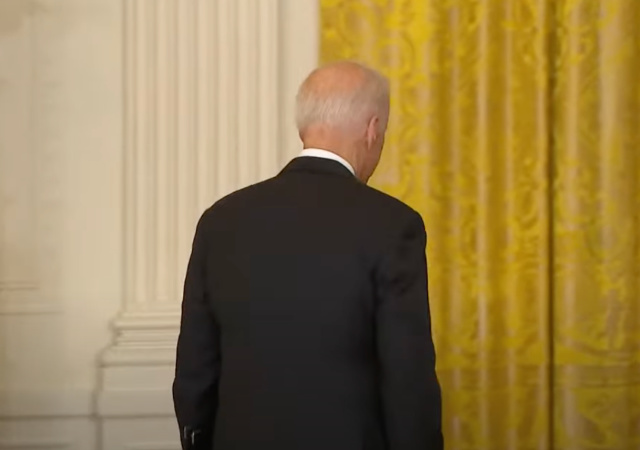Democrats Plan To Close Enthusiasm Gap By Paying People To Nag Their Friends About Politics

While it’s best not to get cocky, Democrats do seem to be heading for a disappointing midterm election in November.
Not only are they facing the usual swing that Americans historically prefer in keeping the Legislative and Executive branches in different parties, but Joe “I’m the Democratic Party” Biden is still sinking in poll after poll, and who knows how low he can go? Unlike his two predecessors in the White House, he doesn’t have a base, so there really is no floor for him.
On top of an historically unpopular president, there is rampant inflation that doesn’t seem likely to abate in the foreseeable future, chaos at our Biden-opened border, the world on the brink of another world war, and the long list of culture war crazy the radical left is pushing in government, schools, and corporations.
From attempting to nationalize our elections to defunding the police to pushing racist ‘antiracism’ training to trying to legalize abortion until the moment of delivery to teaching sex and sexuality to K-3rd graders, the Democrats have completely lost the plot . . . and the support of the vast majority of American voters (including those they sent taxpayer money to).
But fear not! They have plans to address the “real” problem, as they see it. The “real” problem is messaging and getting out the vote. Oh, never mind all that stuff about how they are losing support across all races, genders, and age groups (and whatever other bazillion identity boxes into which they try to define and confine us). That’s only happening because the term “progressive” is the problem, not the policies themselves, those are fabulous.
Another area Democrats are concerned about is that not enough people love Democrats and want to champion their fabulous (but not ‘progressive’) policies to their friends and neighbors.
Well, Democrats have a solution for that problem, and it’s the same solution they have for all problems: throw money at it. That’s right, they are going to pay people to talk to their friends, family, and neighbors about how great Biden and the Democrats are.
No, this is not the Bee.
Politico reports (archive link):
A group of Democratic strategists is trying to spread a novel organizing tactic in this year’s election. Technically, it’s called “paid relational organizing,” but it boils down to this: paying people to talk to their friends about politics.Democrats think it helped them win the Senate in 2020 — and are hoping the get-out-the-vote strategy will help limit the pain of a brutal 2022 election environment.. . . . In particular, the Ossoff team hired 2,800 Georgians, specifically targeting those with little or no voting history themselves to do this outreach to their own networks. The campaign was making a bet that many of the friends and family of their highly political volunteers were already engaged in the runoff election, but that this group could expand the electorate with relational outreach into their networks — which were likely to include more irregular voters or non-voters like them. The campaign folded this data into their vast field program, tracking conversations and whether those contacted had voted. They could even notify organizers, based on their own network, which voters were tagged as “only reachable by you.”A post-election analysis found their efforts boosted turnout by an estimated 3.8 percent among the 160,000 voters targeted through their relational program. Ossoff and now-Sen. Raphael Warnock (D-Ga.) won by 1.2 points and 2.1 points respectively, flipping the state and the Senate to Democrats.
Paying people to talk about Democrats is apparently all the rage on the left; there are groups of them organizing this desperation campaign all across the nation.
Politico continues:
The Progressive Turnout Project, another canvassing group, is putting $1 million behind a paid relational program in Georgia, Arizona and Nevada — top battleground states this fall. Red Wine and Blue, a group focused on organizing suburban moms, is also working with them on a volunteer relational program.The Texas Democratic Party is rolling out a statewide volunteer relational program, called Connect Texas, giving every county party in the state access to those tools. They’re also piloting a small paid relational program. And in partnership with PDI, a progressive technology company, they’re also launching an app that allows campaigns and committees to use relational organizing for voter registration — a tool that lets volunteers or paid organizers check whether their family and friends are registered to vote, then help them sign up for it. It’s also customized for states that require voters to physically mail in their absentee ballot requests, like Texas.
This whole thing is just sad. This “relational organizing” is just astroturf, of course, but on a whole new level that involves political campaigns.
Relational organizing itself is not new, with a long history in community organizing movements. But incorporating it as a central feature of a political campaign is new. And reaching voters, especially less-likely voters, through trusted communicators is an especially important goal for Democrats this year, with the party facing a stiff midterm climate and a serious enthusiasm gap.
Nothing will close that enthusiasm gap like paying people to be enthusiastic. And stuff.
Remember the utter humiliation of Michael Bloomberg when it came out that his paid social media army were also (and more forcefully) supporting Bernie? That’s what happens when you have to pay for support, though; it’s as deep, authentic, infectious, and lasting as paid support can be.
CLICK HERE FOR FULL VERSION OF THIS STORY